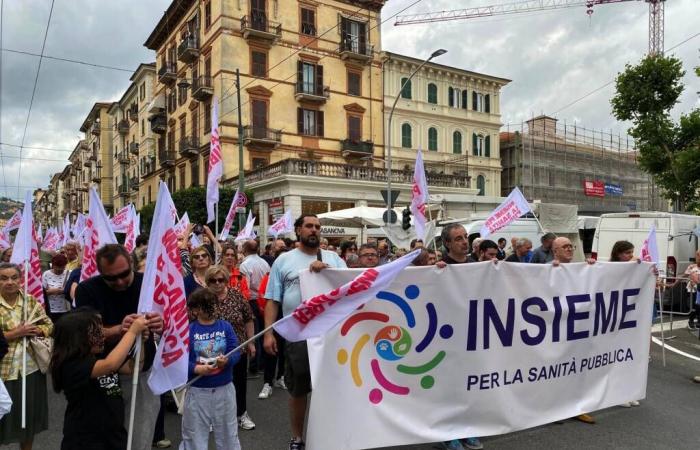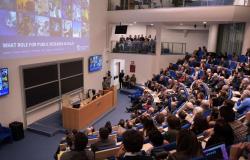A demonstration like this hasn’t been seen in the city for a long time. We finally woke up. Workers and citizens, “together for public health”. It was the winning idea of the association network that was created in the province a year ago and has taken root in the area with widespread assemblies in towns, neighborhoods, workplaces, up until the big meeting in the square on Friday.
Gino Di Sacco spoke on behalf of the associations:
“We are faced with a problem of rights that are failing. We don’t need to bow our heads, but all work together. Privatization is a specter and we must prevent it from taking over. Our common thread is the request to increase resources and healthcare personnel, because there is a shortage of doctors and nurses, the emergency rooms are always full and the waiting lists are too long. In the last twenty years, 40 billion have been cut to public health.”
The total harmony with the most significant names in Italian scientific research – people outside the political arena – who have recently felt the moral need to have their say on healthcare is significant. Their document directly criticizes the choices of the Meloni government. Starting from the limited budget available to the National Health Service, which jeopardizes the existence of public and universal welfare like that inherited from the 1978 reform. “The data demonstrate that the system is in crisis”, the scholars denounced:
“Decrease in some health indicators, growing difficulty in accessing diagnosis and treatment paths, increase in regional and social inequalities. This happens because the costs of technological evolution, the radical epidemiological and demographic changes and the difficulties of public finance have made the NHS severely underfunded, to which 6.2% of GDP will be allocated in 2025 (less than twenty years ago) ”.
The most dramatic problem for the maintenance of our healthcare system is represented by the shortage of medical and nursing staff. For this last category we are heading towards a negative record at an international level (6.6 x 1,000 inhabitants compared to an OECD average of 8.6) and with an absolutely anomalous nurse-doctor ratio.
According to the recent report to the Chambers of the Court of Auditors, Germany invests 423 billion and France 271. “At purchasing power parity – write the accounting magistrates – Italian spending per capita is less than half that of Germany”.
In La Spezia we have reached an unsustainable point, even more serious than elsewhere. The secretary of the CGIL Luca Comiti explained it in his speech in the square:
“We are in last place in terms of number of employees and beds in relation to the other Ligurian provinces. There is a shortage of over 1000 doctors and nurses compared to the average of the other Ligurian provinces; 164 beds are missing in the Sant’Andrea della Spezia and San Bartolomeo di Sarzana hospitals compared to the national standard; 1500 beds are missing in healthcare residences compared to the average of the other Ligurian provinces”.
In this situation it is serious that the Region has decided that the Felettino hospital will be built by the private sector and that the ASL5 coffers, already exhausted, will be devastated by the payment of fees to the private sector. Yet it was so simple to do it entirely with public money!
What is happening is clear: the “spectre of privatization” is increasingly advancing, as Comiti denounced:
“Does it take six months for an MRI? Go to a private individual who can do it in a week. Is there no staff for the health homes? Let’s entrust them to private individuals. A harmful logic that must be opposed with all our strength.”
A key focal point is that of local assistance. For decades we have been talking about continuity of care (hospital-territory-home and vice versa), but no progress has been made. The government has progressively cut the number of community homes to be built with Pnrr funds. And it is not at all clear which figures – family doctors, specialists, community nurses, social workers – will actually operate there. Yet, as the researchers write, “the problem can no longer be postponed: in 25 years almost two out of five Italians will be over 65 (many of them suffering from at least one chronic pathology) and the system, already in serious difficulty today, will not will be able to assist them.”
It is increasingly emerging that what needs to be questioned, as Di Sacco and Comiti said, is the corporatization of healthcare. Because if the same public actor becomes a company it is completely logical that we rely more and more on the private sector, in a way that is not complementary but increasingly competitive and even substitutes for the public sector. In a competition that is also increasingly unequal because the private sector will focus on the most profitable activities, leaving to the public those that are indispensable but unprofitable (emergencies, pandemics, care for the chronically ill or the elderly).
Already in May 2019, Pope Francis, speaking to the Catholic Association of healthcare workers, spoke about the consequences of corporatization in the life of hospitals:
“Corporateisation has placed the reduction of costs and the rationalization of services in the foreground, it has profoundly changed the approach to the disease and to the patient himself, with a preference for efficiency which has often overshadowed ‘attention to the person… And where a patient becomes a number you too risk becoming one, and being burned out by work shifts that are too hard, by the stress of emergencies and by the emotional impact’.
Friday’s demonstration must also serve to resolve the increasingly evident contradiction between health and corporate logic, to recover territorial and participatory management of citizens’ health.
Today we are stronger in claiming the right to health: a fundamental right that must return to being fundamental in practice. The economy, the government, the Region – but how long will we have to be “governed” by an entity whose president is under house arrest? – the healthcare company cannot interpret this right in order to make it compatible with needs other than those of health. Health is non-negotiable. Neoliberalism has failed: public health is not just the past, it is above all the future.
The real problem is not integrating the public with the private but reaffirming the sovereign role of the public by recognizing the private sector as a purely auxiliary one. The use of the private sector is not under discussion but as the art. 46 of law 833 of 1978 – conquered with the struggles of 1968 and the Hot Autumn – whoever wants it must pay for it, that is, he cannot have it paid for by the State or someone else. The right to health can only be guaranteed with a strong public service.
Yesterday was just the beginning. As Comiti and Di Sacco said, we will move forward, because this is “the mother of all battles”. Or, better yet: a decisive piece of the “mother of all battles”, the defense and implementation of the Constitution.
Post Scriptum
Today’s photographs were taken during Friday’s demonstration by Marco Ursano.
On the topic of healthcare in La Spezia, I refer you to my latest article in this column:
“Healthcare, it’s time to wake up”, “Città della Spezia”, 11 June 2023.





